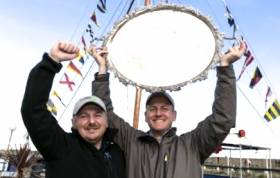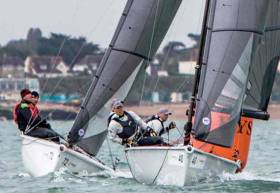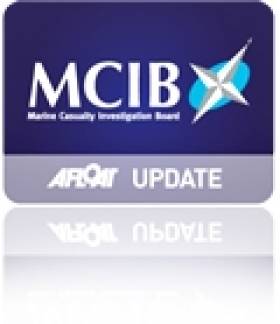Displaying items by tag: Michael O'Connor
Michael O’Connor is Sailor of the Month for October
Michael O’Connor of Royal St George YC is “Sailor of the Month (Senior)” for October after emerging as the 73rd All-Ireland Champion Helm after a ding-dong two-day final raced in Flying Fifteens from the National Yacht Club on October 5th & 6th. No stranger to success, O’Connor was the Corinthian Champion in the SB20 Worlds in Cowes in 2017, and this year he secured his place in the all-Ireland with victory in the SB20 Nationals at the RIYC.
David Taylor is Sailor of the Month (Special Award) for October
Every keen helmsperson needs a Davy Taylor as his or her right-hand man when the chips are down. down. In 2013 he was there to help Ben Duncan win the All-Ireland in ISA J/80s, then, in 2019 he was the efficient and essential presence to get Michael O’Connor over the line as the 73rd All Ireland Champion, and he gets the October Special Award by popular acclaim.
Royal St. George Yacht Club Trio Now Lying Fourth At SB20 Worlds
Royal St. George Yacht Club's Michael O'Connor, Davy Taylor and Ed Cook are looking for a podium finish at the SB20 World Championships in Cowes today.
The Dun Laoghaire trio are fourth overall and ten points off the lead and four points off the podium after a stunning penultimate day of racing.
O'Connor is in first position for the Corinthian Trophy and beating many of the professional sailors to boot!
The forecast is for light winds again today but who knows what the wind gods will throw at the fleet today.
After four days of racing a new world champion will be crowned this evening at the Royal Yacht Squadron and Ireland is in with a shout.
Competitors got four races yesterday in what turned out to be a windier day than predicted. It was pretty shifty with the breeze varying between 6-25 knots in conjunction with strong tides, making this yet another tricky day of sailing.
With conditions making it hard to be consistent, O'Connor's Dublin Bay–based Sin Bin scored a 2, 3, 6 and 17 to move up from seventh to fourth overall.
it was a tough day for tacticians with no rest from the changeable weather. With a full day of racing now behind us a lot of the top teams are carrying big scores ahead of the final day tomorrow.Now we’ve got one more day to go tomorrow with the potential for an additional three races.
A lot of boats will hope they used their discard up today as there is only one in this final series.
Competitors will compete in the final few races before the new World Champion is crowned tonight.
The results currently stand as follows:
1. Export Roo – Australia
2. Give Me Five! – France
3. Xcellent – Great Britain
4. Sin Bin – Ireland
5. Sportsboatworld.com – Great Britain
6. Marvel – Great Britain
For a full list of results click here
Team Ireland are making a great showing as follows:
4th SINBIN Michael O'Connor, Davy Taylor, Ed Cook
22nd Bad/Kilcullen Stefan Hyde, Jerry Dowling, James Dowling
27th Lia Dave Barry, Cillian Dickson, Gareth Nolan
31st Venuesworld Ger Dempsey, Graeme Grant, Chris Nolan, Diane Kissane
36th Two Men and their Monkey Daragh Sherridan, Shane Murphy, John Phelan
61st Sea Biscuit Marty Cuppage, Niall O'Riordan, Barry Galvin
MCIB Highlights Danger of Fishing Without Safety Gear
The Marine Casualty Investigation Board (MCIB) has called on the Government to continue highlighting the dangers of operating boats without adequate safety equipment, following its report into the death of a Wexford fisherman last year.
Michael O'Connor drowned after going overboard from his small open boat while fishing alone at Cullenstown, Co Wexford in the early hours of 7 September 2010.
The local Irish Coast Guard unit initiated a search when he did not return as expected later in the morning. His body was subsequently located next to his upturned boat around 9am.
It is not known to investigators how O'Connor came to be in the water when the incident occurred. He was found to be wearing a lifejacket, but no flares, VHF radio or other safety equipment were found on board his vessel.
The boat itself was also not a registered fishing vessel, and was unsuitable for carrying the fishing gear O'Connor had been using.
The report stated: "The combination of boat size, darkness, weather conditions, tidal flow, fishing equipment and the absence of safety equipment other than a lifejacket combined to increase the danger and reduce the chance of survival."
The full report is available to download as a PDF from the MCIB website HERE.
































































